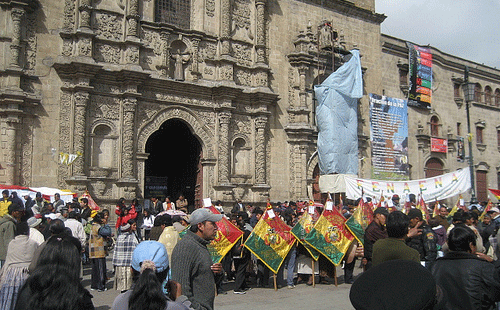Evo Morales suffered a significant setback. That’s the simplest way to interpret the results from
Morales had good reason to celebrate the gains of his Movimiento al Socialismo (MAS) party. MAS candidates placed first in five of nine governors races, and the party’s candidate in Pando looks likely to edge out his chief rival. Even though runoff contests will likely be required in the departments of La Paz and Pando, this is better than the three prefectures (autonomy provisions in the new constitution replace “prefects” with “governors”) MAS won in 2005. Likewise, MAS did better overall in municipal contests than it did in 2004, increasing its representation in key cities like
But these advances—falling far short of government expectations, particularly so soon after sweeping victories in December—led to finger pointing. A day after the vote Morales admitted that he had expected a better showing and placed much of the blame on local party leaders. Others blamed the party hierarchy for selecting unknown candidates or, in some cases, even overruling by dedazo (force) the candidate selections of its grassroots, base organizations—a critical misstep for a party that defines itself as a “bottom-up” political movement.
The party’s losses were always predictable but still stung. Opposition mayoral candidates won in seven of the country’s 10 major cities. In
A Changing Power Structure?
The real problem for Morales is in the opening of two new “fronts” challenging his presidency. The first and most important is defined by the MAS-MSM split. The MAS-MSM partnership that began with the 2005 presidential election anchored Morales’ presidency. When MSM announced it would campaign independently in the April elections, things got ugly.
Morales’ administration has been furiously indicting various figures on “corruption” charges: previous presidents and vice-presidents, former ministers, current opposition prefects and mayors, and opposition candidates (including former MAS defectors). The most embarrassing case involved Felix Patzi. A close Morales confidant (previously education minister), Patzi was the MAS candidate for governor of
The bitter MAS-MSM split cost Morales dearly. At the national level, it threatens the government’s legislative majority: Several MAS legislators—including Ana María Romero de Campero, the Senate president—are actually MSM legislators. At the local level, MSM is also a potent threat: after winning more than 100 municipal contests, it is the country’s second-largest party.
These changing dynamics could affect Morales’ traditional, most loyal political base: the La Paz-El Alto metropolitan area. In
The second new front Morales faces is, ironically, in rural and primarily indigenous areas. Here, the data is much less clear, since vote counting in outlying areas is notoriously slow. But preliminary reports show voting for MAS decreased in key rural areas such as Achacachi, where MAS placed third. In many parts of the country, the “anti-party” discourse has extended even to MAS, which is seen as merely another political party. Instead, rural and indigenous communities field their own, micro-local political organizations and frequently see MAS candidates as interlopers. Morales and his policies remain popular in rural, indigenous communities. But this isn’t translating into loyalty to MAS as a political party.
Moreover, many of the MAS candidate choices were puzzling. While criticizing Del Granado for having played a role in the politics of the 1990s—and therefore being “reactionary” and corrupt—the party nominated Roberto Fernández (no relation to Percy Fernández), a right-wing populist involved in massive tax fraud and mismanagement of municipal resources, to the mayorship of Santa Cruz.
The fallout from April 4 suggest that MAS has failed to achieve its stated campaign goal of becoming a hegemonic party. Sure, the opposition remains fragmented and divided. But it’s increasingly clear that MAS is an uneasy patchwork alliance that to many voters looks too much like the juntucha (ad-hoc) alliances of the old party system.
The heavy-handed rhetoric that paints all Morales opponents with the same brush strokes—making no differences between a proto-fascist like Garcia Mesa and a social democrat like Del Granado—have made it difficult for MAS to secure victories where it matters most: at the local level.







